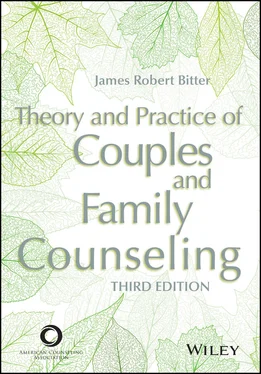James Robert Bitter - Theory and Practice of Couples and Family Counseling
Здесь есть возможность читать онлайн «James Robert Bitter - Theory and Practice of Couples and Family Counseling» — ознакомительный отрывок электронной книги совершенно бесплатно, а после прочтения отрывка купить полную версию. В некоторых случаях можно слушать аудио, скачать через торрент в формате fb2 и присутствует краткое содержание. Жанр: unrecognised, на английском языке. Описание произведения, (предисловие) а так же отзывы посетителей доступны на портале библиотеки ЛибКат.
- Название:Theory and Practice of Couples and Family Counseling
- Автор:
- Жанр:
- Год:неизвестен
- ISBN:нет данных
- Рейтинг книги:5 / 5. Голосов: 1
-
Избранное:Добавить в избранное
- Отзывы:
-
Ваша оценка:
- 100
- 1
- 2
- 3
- 4
- 5
Theory and Practice of Couples and Family Counseling: краткое содержание, описание и аннотация
Предлагаем к чтению аннотацию, описание, краткое содержание или предисловие (зависит от того, что написал сам автор книги «Theory and Practice of Couples and Family Counseling»). Если вы не нашли необходимую информацию о книге — напишите в комментариях, мы постараемся отыскать её.
Theory and Practice of Couples and Family Counseling — читать онлайн ознакомительный отрывок
Ниже представлен текст книги, разбитый по страницам. Система сохранения места последней прочитанной страницы, позволяет с удобством читать онлайн бесплатно книгу «Theory and Practice of Couples and Family Counseling», без необходимости каждый раз заново искать на чём Вы остановились. Поставьте закладку, и сможете в любой момент перейти на страницу, на которой закончили чтение.
Интервал:
Закладка:
The first family you see will probably be in a practicum or internship, and you will be under supervision. Being observed when you see your first family is often an added distraction, but it is also an essential safeguard for you and the family. It is not uncommon for the concerns, issues, and problems in the family to trigger unresolved, unfinished, or unaddressed issues in your own relationships. Knowing that you have an experienced practitioner backing you up can help turn your initial anxiety into excitement. Here are a few guidelines that may support your development as a family practitioner.
Getting Started
It is normal to feel a little anxious when you go to meet your first family. It may help you to remember that the family is probably nervous too. So are all of your fel low practicum students or interns. Start with your courage. You have met people before, and you know how to bring forth your interest, your friendliness, and your warmth. Think about what you do when you want to welcome someone into your home. The same qualities will serve you well when you meet families for the first time. Take a deep breath and use your eyes and ears to really take in each person.
At first, be willing to listen and engage the family without having to change it. Be patient. If you get too concerned about what theories or techniques might inform your work, you will lose contact with the family. Start by being as fully present as possible. Ask yourself what you are hearing and what you are seeing. Respond empathically. Let each person know that you hear and understand them. You can trust things to unfold.
Have the Courage to Be Imperfect
“The courage to be imperfect” is a phrase coined by Sofie Lazersfeld and used extensively by Rudolf Dreikurs and other Adlerians (Terner & Pew, 1978). This kind of courage comes from accepting ourselves as human beings who are not perfect and who make mistakes. Effective counselors often trust their intuition or make guesses and observations that they hope will be useful in family work. Reasonable risks are part of the work we do. They are also the foundation for the mistakes we make. If you are going to learn to be an effective family practitioner, you are going to make mistakes. They cannot be avoided. Having the courage to be imperfect is having the courage to be human—and to be ourselves. It is having the courage to be wrong and admit error; to experience the disagreement of others; and to reconsider and correct faulty impressions, interpretations, or the language of our interventions.
Study Your Own Work
Much of the coursework you will have before you see your first family will have addressed your personal development and the way you think about and conceptualize family process. When you start to practice family counseling, you will begin what I hope will be a lifelong commitment to skills development. Nothing will serve this process more than recording as much of your work as possible. Be willing to spend the hours necessary to watch your sessions and reflect on what worked well for you and what you want to change in the future.
It may take you a few times to get beyond being concerned about the way you look or the way your voice sounds, but even these observations can begin to give you some information about what works and what does not. Be patient with yourself and just notice what you actually do: This will also help you be patient with families. What you actually do in family practice will say more about your family practice than what you think you should be doing. What underlying beliefs and values seem to be the foundations for the choices you make in your work? How do family members respond to you and to your interventions? What goals and objectives seem to be present in your efforts? Studying your own work will make the difference between one day having 20 years of experience or having 1 year of experience 20 times over. If you would like some guidance in how to study your own work, I highly recommend the work of Tony Rousmaniere (2017) on deliberate practice.
Cultivate Silence and Reflection
Dealing with silence can sometimes be one of the hardest things for new practitioners to learn. We are used to conversational engagement, and we may have a desire to fill gaps with any comments that come to mind. Silence in our clients can be a sign that they are thinking about themselves or others in the family, are thinking about what just occurred in the session, or simply do not know what to say. Silences in family work tend not to last very long, but they can feel twice as long as they are in actual time.
Learn to Tolerate Quiet Times
Use quiet time to observe and to reflect. What has just been happening? What are the people in the room feeling? Who is doing what with whom? What are you feeling at this moment in time? You do not want your reflections to distract you from staying present, but with practice you will be able to check in with yourself without losing contact with the family.
Most of us reflect on our work after the session is over. I encourage family practitioners to write their reflections in a journal as a regular part of their practice. Think about what happened in the session. What were you feeling and experiencing? What did you consider saying that went unsaid? What did you say or do that you wish you had not or that needed better timing? What issues came up for you? How do they relate to your own family or relational experiences? What part of your self-reflection would be important to discuss with your supervisor or peers? Is there anything in your reflections that you think would be useful to share with the family? Keeping a journal of these reflections is one way to mark your growth and development over the span of your career.
Think About Your Evolving Role as a Family Practitioner
One of your most important reflections will be on your evolving role as a family practitioner. What does it mean to you to be a family counselor? What do the processes and activities in your work say about you as a professional? As you read about the different theories and models of family counseling, you will have to consider a wide range of roles and functions. Some roles will include directive interventions; some will be more collaborative. Some roles will focus on assessment of dysfunction and change; some will focus on strengths and resiliency. Some will be interested in communication and meaning; others will be primarily interested in behaviors. Which of these roles and functions are a good fit for you?
Salvador Minuchin suggested that his role as a family therapist evolved over more than 30 years of practice (S. Minuchin & Zeig, 2005b). He was not the same structural family therapist at the end of his career as he first described in the 1970s. His style and process changed as he grew older. He learned from the families he interviewed, and he learned from his peers. He noted that he “copied” many aspects of style from fellow therapists like Carl Whitaker, Jay Haley, and Michael White. When he copied these people, he may have borrowed a way of phrasing a question, giving a directive, or engaging certain family members, but he used these interventions “with a Spanish accent”; that is, he integrated new and different styles and made them his own.
You cannot define your professional role once and for all. It will evolve and change depending on the clients with whom you work, the services you provide, the location and setting of your practice, and the training and collaborations in which you engage. My own work has led me to a belief in encouragement, a focus on strength and resiliency in families, the dismantling of constraints and restrictions, and the facilitation of change through enactments and the development of new experiences.
Читать дальшеИнтервал:
Закладка:
Похожие книги на «Theory and Practice of Couples and Family Counseling»
Представляем Вашему вниманию похожие книги на «Theory and Practice of Couples and Family Counseling» списком для выбора. Мы отобрали схожую по названию и смыслу литературу в надежде предоставить читателям больше вариантов отыскать новые, интересные, ещё непрочитанные произведения.
Обсуждение, отзывы о книге «Theory and Practice of Couples and Family Counseling» и просто собственные мнения читателей. Оставьте ваши комментарии, напишите, что Вы думаете о произведении, его смысле или главных героях. Укажите что конкретно понравилось, а что нет, и почему Вы так считаете.












